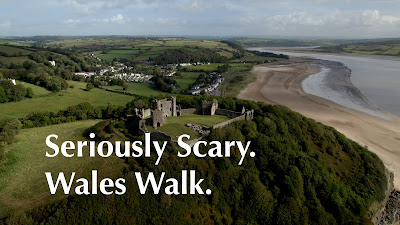Safety Spotlight - Let there be smiles and sun, not tears and fears!
It’s hotting up for the weekend and the week ahead! If you’re among those popping on the sunglasses and picking up the buckets and spades ready to make the most of the warm weather at the coast, we want you to take home the happiest of memories.
Whether you’re a regular beach-goer or visiting for the first time in a while, do take care and keep safety-aware.
Hot or not, accidents around the coasts can still happen even on the sunniest of days, trouble can still be around the corner and pop up when you’re least expecting it.
In the last month, our teams and fellow emergency services colleagues have been out as usual, helping people in difficulties around the coast. Enjoy the sun and the coast but don’t let an accident happen to you or your loved ones this weekend!
 |
| Library image from Shutterstock |
It happened to one family recently on a bright sunny day at Burnham-on-Sea. A little girl was playing by the water with her dad and then said she was going back to see mum who was not far away, but she lost her bearings. It turned into over an hour of the worst fear and panic any parent can imagine.
A 999 call to the Coastguard was made and thankfully as the teams arrived on scene, dad shouted with joy as he spotted his daughter being brought to the beach warden’s hut by a woman who'd stepped in to help.
Safety tips: Visit a lifeguarded beach, check with the lifeguard hut and beach office and take advantage of free wristband schemes, take an up-to-date picture of your group as soon as you arrive which helps if we need to identify lost children. Alert the lifeguards or beach wardens the minute a child goes missing or call 999 and ask for the Coastguard. We’d rather be safe than sorry.
 |
| Credit Burnham-on-Sea Coastguard Rescue Team (taken pre-Covid) |
Pedalo panic: This week, four people who’d hired a pedalo at Ballycastle beach in Northern Ireland had an unexpected dip in the sea. Even when it’s hot, the waters around our coasts are still chilly enough to cause cold water shock which can leave you gasping for air and getting into difficulties. Fortunately, the four got back to shore safely with minor injuries. We sent our teams from Ballycastle and Coleraine and the Northern Ireland Ambulance service (including the air ambulance).
Safety tips: If you find yourself in the water unexpectedly, try to stay calm and resist the instinct the thrash around, lean back, extend your arms and legs and float until you can control your breathing. Then call for help or swim to safety if you can.
In a hole: Most children (and plenty of us adults too) love making sandcastles and digging holes in the sand. But it’s not a great idea to dig too deep as one young man discovered earlier this month in Cornwall. He’d dug a large hole and then found himself trapped when the sand collapsed – sand is surprisingly heavy, it can crush bones and suffocate you. Emergency services went to the rescue and fortunately he was dug out safely. If it’s taken you three hours to dig a hole, that’s how long it might take to dig you out.
Safety tips: Have a great time on the beach but don’t dig too deep. A hole with some water for the kids to play in is fine but a hole so deep that your head is barely poking out is best avoided. Don’t leave holes unattended and always fill it back in when the fun has finished so it’s not a hazard for other beach users.
Here's our 'hottest' beach safety tips
- Visit a lifeguarded beach and swim between the red and yellow flags
- If there’s a free wristband scheme on the beach, do use it
- Call 999 in an emergency and ask for the Coastguard
- Alcohol and the sea don’t mix. If you’re having a glass of something cold, just enjoy the view, not the water
- If you find yourself in the water unexpectedly or if you get into trouble Float to Live – lie on your back and relax, resisting the urge to thrash about
- Don’t take unnecessary risks: leave inflatable toys at home, don’t climb up cliffs, sit too close to them or go near the edges
- After bad weather and heavy rain (like the weather we’ve had recently), cliffs can be more unstable than usual. Stay away from the edges and stay as far back from the base of a cliff as its height. EG if a cliff is 25metres high, stay at least 25 metres from its base
If you see anyone in difficulty around the coast, please don’t get into trouble yourself by trying to help. We’re fully trained to tackle all circumstances and we’ll be there 24/7. Call 999 and ask for the Coastguard and we’ll send all the experts to help. Fast.
USEFUL LINKS



